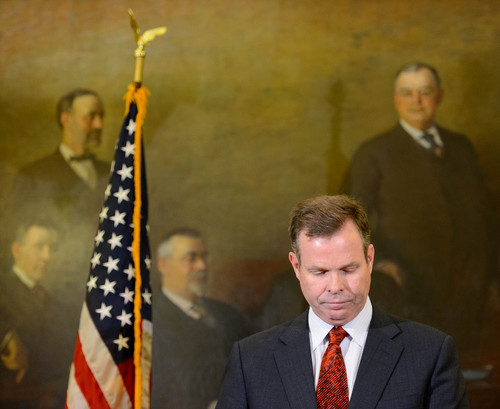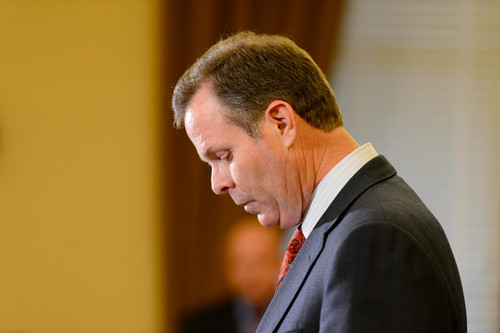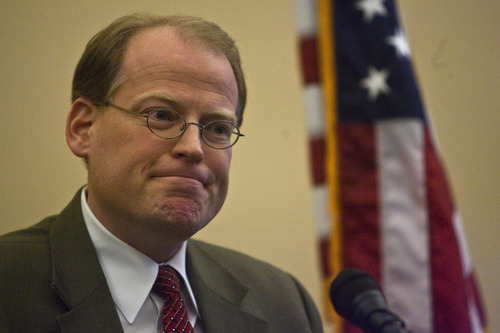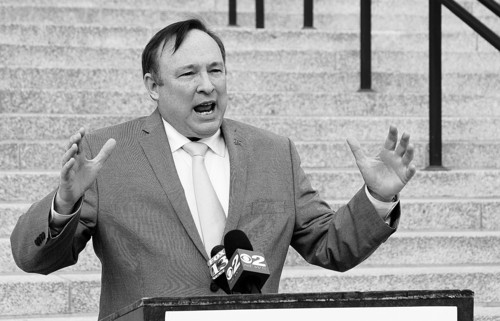This is an archived article that was published on sltrib.com in 2013, and information in the article may be outdated. It is provided only for personal research purposes and may not be reprinted.
When Utah Attorney General John Swallow announced his resignation on Thursday while defiantly proclaiming his innocence, he said the timing had nothing to do with a report due out that very day from a special counsel investigating alleged violations of campaign finance and conflict-of-interest laws.
But, the delayed report, issued Friday, made clear that Swallow's timing — even if coincidental — was probably a smart move.
Had Swallow not resigned, he now would be facing the real possibility of a judge removing him from office. Utah Democratic Party Chairman Jim Dabakis quipped that would be "like getting Al Capone on tax evasion."
But it shows that penalties in campaign laws — which historically have led to little more than slaps on the wrist — can have some teeth. Many bills are soon to be considered that could add even more.
"Candidates need to take this seriously," said Mark Thomas, elections director for Lt. Gov. Spencer Cox, after Friday's release of a special counsel's report that asserts Swallow violated campaign laws and could have faced removal from office.
"Election laws may not be the sexiest way to get someone who is a crooked or unethical politician, but it works. It's not to be taken lightly," said Maryanne Martindale, executive director of the left-leaning Alliance for a Better Utah, which had filed the complaints against Swallow.
In the not-distant past, running afoul of campaign laws led to little punishment in Utah.
A search of news archives found only a few punishments in recent years.
For example, at least four minor candidates were removed from the ballot for failing to file campaign donation disclosure forms. Some lobbyists were fined a few hundred dollars for filing forms late. Rep. Paul Ray, R-Clearfield, self-reported a violation (after questioning by The Tribune) for misspending campaign money to take his family to a circus, and he had to repay it and pay a $64 fine to the state.
—
Adding a few teeth • Usually, though, candidates faced few, if any, consequences. As recently as 2010, one of every eight legislators missed deadlines for required online ethics training. They simply hurried to finish it after staff warned them that they were late, and they faced no other penalties.
Lawmakers, though, have toughened up parts of campaign law in recent years regarding disclosing potential financial conflicts. A failed ethics initiative helped prod legislative action.
"The requirement to disclose conflicts of interest has only been in place since the 2010 election cycle," Thomas said. "There has been some minor complaints of candidate's conflict of interest reports, but none were as extensive" as what were alleged about Swallow.
The special counsel's report says Swallow intentionally hid payments and his interest in companies related to allegations that he was involved in attempting to facilitate bribes, make promises of preferential treatment and take improper gifts.
Martindale says given past wrist-slapping, she frankly is surprised and pleased at how seriously her group's complaints were treated — and how it shows some improvements in law in recent years. But she said more reforms are needed because some types of unethical behavior still likely are not technically illegal.
"We literally have no campaign finance laws. We have reporting laws [about donations received], but there's really still no restrictions in terms of who can donate in any amount to any candidate," she said.
—
Wide open • Rep. Kraig Powell, R-Heber City, a member of the Government Operations Interim Committee, which oversees campaign reform, said Utah laws are so wide open without any donation caps "that there's no way for officeholders to really know if certain conduct should be avoided, because there's no guidance from the law."
Powell — who personally does not accept donations from lobbyists, special interests or corporations — said a problem the Swallow scandals show is "many people were saying even if these allegations are true, did he break the law? We don't have a lot of campaign-finance regulation, so maybe there's not a law that's broken."
Similarly, Kirk Jowers, director of the Hinckley Institute of Politics at the University of Utah, said a state commission he cochaired that looked at ways to strengthen democracy talked about the need for donation limits — which he says the Swallow scandals show are needed.
"You're fighting against some preconceptions when you take $100,000 from someone, whether you did something wrong or not," he said.
Thomas said the lieutenant governor's office will use the special counsel's report to identify any changes in law it feels are needed.
Already, requests have been filed for more than two dozen bills on campaign and election reform for the Legislature's next session, beginning in January. Powell's committee endorsed one this week that, ironically, might make it more difficult to void elections for violations.
It would allow such action only if the violation affected the outcome of the election, which could be difficult to prove.
Powell, though, said legislative attorneys warned "that without that provision in the bill, the statute could be held unconstitutional," because a candidate could argue a minor violation wouldn't have changed an election outcome, especially if the margin of victory was wide, as in many Utah races.
Utah campaign laws are now so loose, said Powell, that, at least so far, "I don't see much positive effect on other office holders from the Swallow inquiry because we haven't changed the underlying ground rules. ... There ought to be some guidance, some incentive to avoid the types of situations that Swallow found himself in."
Martindale said it's time to draw hard lines in campaign laws.
"I think we've operated for far too long under the assumption that we just elect good people and we should trust them and everything's going to be OK. By and large most of our elected officials are well-meaning people, but we can't just make that assumption," she said. "We should have laws in place to take care of when that's not the case."









